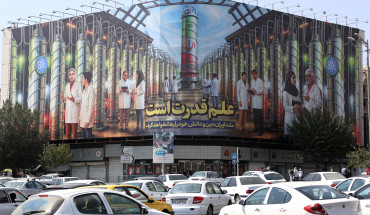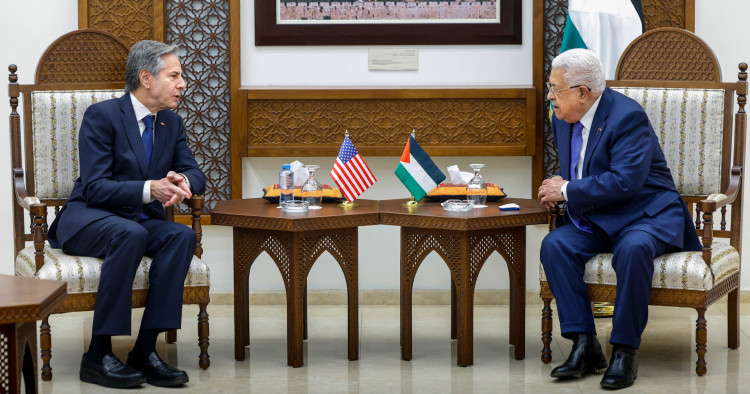As soon as the scale of Hamas’ Oct. 7 attack on Israel became apparent, it was clear that the modus vivendi between Israel and Hamas that had developed over years, even decades, would not survive. And indeed, the Israeli leadership quickly adopted a set of ambitious policy goals, which boiled down to destroying Hamas’ military capacity and its ability to govern.
As such, Israel’s military campaign will not end on a definite date; rather, the articulated goals will lead to a diminishing but indefinite Israeli military and security presence within the Gaza Strip. What remains unclear is how, or even if, Gaza will be governed and how security for Gazans rather than Israelis will be managed. There is planning by many officials to be sure, and senior United States officials among others have worked toward generating some greater regional coordination. But all the hopeful plans released or whispered about to date will almost certainly not work as expected: They are based on ideas that have been tested in the past and found wanting. In particular, the ideas that Palestinian governance can be improved but that Palestine (as a political entity) can wait, and that Palestinian Authority (PA) “reform” as defined internationally will launch events in a better direction are worse than bankrupt: Those presumptions helped produce the current environment, in which leaders of both Israel and Hamas find that the best way to earn domestic applause is to deploy indiscriminate violence. Some version of the reform plans now being discussed are being pursued, with the likely effect of deepening rather than overcoming the impasse that has yielded such horrific results.
Planning to plan
Left unsaid in the weeks after Oct. 7 — which even concerned those who backed Israel’s military campaign and assumed it would be successful — was what was going to come next. Within a few days, however, analysts and think tanks around the world rushed to offer their “day after” ideas, while foreign diplomats pressed the Israeli leadership for answers on its intentions. Various floated scenarios placed responsibility for security and governance in Gaza on the United Nations, Egypt, or a multinational regional coalition; but most of these ideas have since petered out when those actors emphatically rejected the roles they had been volunteered to play.
US Secretary of State Anthony Blinken addressed this vacuum on Oct. 31, calling for an “effective and revitalized Palestinian Authority” to govern Gaza; on Nov. 18, President Joe Biden gave full endorsement to the idea but added only a longer-range hope rather than additional detail: “As we strive for peace, Gaza and the West Bank should be reunited under a single governance structure, ultimately under a revitalized Palestinian Authority, as we all work toward a two-state solution.” This sent the unequivocal message to the PA that the United States was determined that the leadership in Ramallah would eventually have to take responsibility for Gaza — while implicitly acknowledging that the PA was neither able nor willing. As Palestinian leaders continued rejecting the idea of returning to Gaza “on Israeli tanks,” the US made clear the PA needed to be “revitalized” first. Yet Biden stopped short of articulating what “revitalized” would mean. He also suggested that revitalization should coincide with the collective “work toward a two-state solution,” though, again, without elaborating on what “work toward” would entail.
Since those remarks, scant details have emerged in public on the meaning of revitalization, how it will be accomplished, and who will do it. A bit more quietly, however, American and European diplomats, tasked with informing their respective capitals’ policies, are internally discussing potential scenarios and seeking input from experts on Palestinian affairs. They are also engaging with Palestinian political and security figures, including former PA officials and political actors in the diaspora. Americans, spearheading these efforts, have advised the PA to tackle corruption and appoint a new prime minister with elevated powers, including the power to appoint cabinet ministers. Periodic media reports and the authors’ own conversations suggest that diplomats are considering the idea of reducing the role of the PA president to a symbolic one, but there are no reports that this last element has actually been discussed with President Mahmoud Abbas.
Wishful thinking about reforming Palestine
Leading Israeli officials, including Prime Minister Netanyahu, have consistently and publicly made clear that the PA should not govern Gaza, but Israel Defense Forces (IDF) and Shin Bet sources have floated rumors of Israeli collaboration with local clan leaders. Similar patterns have apparently emerged in the West Bank, hearkening back to earlier decades of pre-Oslo Israeli policy.. Those Israelis who speak more diplomatically of the PA still treat talk of two states as an anathema, at least for now.
Some former Israeli officials have thus rushed into the breach with ideas that are perhaps meant to sound helpful (Hamas should release all hostages and evacuate Gaza so that international actors — other than those with actual experience — can rebuild), but of course there is no sign they have persuaded those who would need to accept such ideas. These include a so far unbowed and unrepentant Hamas, Arab states anxious to avoid a quagmire not of their making, and UN bodies that have resisted Israeli insistence that they cooperate with relocating Gaza’s population into super camps. In these respects, those pursuing such ideas are in good company: A good deal of analysis that has been put out there about the “day after” continues to ignore what the relevant actors say they want or clearly dismiss.
Essentially, US officials seem to be treating the PA’s “no” least seriously. And that shifts focus right back to the role of a “revitalized” PA in Gaza, with its leaders’ rejection slightly lessening in tone but still insisting that it be coupled with a meaningful advance (“trajectory”) toward Palestine becoming a sovereign country.
What such thinking overlooks, however, is the source of the current PA’s lack of vitality. Its ailments are clear — the leadership is widely derided as undemocratic, corrupt, institutionally underdeveloped, and ineffective. The PA has been deteriorating for decades. And in recent years, Israel’s withholding of tax revenues has placed the PA in a very serious financial predicament. Such criticisms have been the staple of internal Palestinian political discussions for a quarter century; they are generally ignored internationally when the PA leadership is viewed favorably but then picked up at times like the present, when international actors wish the PA were capable of taking on some task that it seems unable to fulfil.
Such selective critiques of the PA overlook the way in which those same international actors have fostered the exact flaws they discover when it is convenient. Economic arrangements have been designed to go through specific officials (such as those in the Palestinian Ministry of Civil Affairs) in a manner certain to spark suspicions of corruption. Constitutional provisions for elections to the parliament were suspended with hearty US and European endorsement back in 2007; since that time, their continued postponement has been internationally endorsed (or at least tolerated) for fear of who might win. Elections seem like a distant memory, but they were a real possibility just two years ago — a lost opportunity that may take years to recur.
The financial influx designed to shore up Palestinian institutions and civil society has rendered beneficiaries dependent on their external connections more than their internal legitimacy. International support for institutional development of the PA has always been equated with backing specific individuals and undermining others — the precise opposite of what institution building is about. And as for the PA’s ineffectiveness — really the heart of domestic criticisms—the body is simply not the kernel of independent statehood its leaders initially promised. Even worse, it is widely seen domestically as effective only in maintaining its unpopular security obligations toward Israel (and in recent years, even that seems under threat at times). A PA that was truly revitalized would have to be seen as part of a viable Palestinian state and not just reflect hopeful talk that one might someday emerge.
Conjuring up reformers: Déjà vu all over again
So when revitalizing the PA, the United States and Europe seem bent on reforming it the same way they have done repeatedly in the past: in a manner that will make it seem just as corrupt, undemocratic, institutionally underdeveloped, and ineffective as it has been — or more so. Their focus seems to be less on developing institutions than on finding the right people who will oversee the PA’s security obligations to Israel. And diplomats are now searching through resumes to find Palestinians who will help them in that effort.
Some Palestinian figures in the political diaspora have already started circling the sinking PA ship. They offer their advice and, presumably, themselves for the day after. Some are doing it publicly for the Western audience (former Prime Minister Salam Fayyad, who has started giving nationalist signals to a domestic audience as well), others privately (ambassador and former Foreign Minister Nasser al-Kidwa, who is well known from his diplomatic days), and some for the Arab audience (former Fatah leader Mohammed Dahlan, well supported in the Gulf). None of these efforts should be dismissed: Fayyad brings international connections; Kidwa brings name recognition and some allies; and Dahlan has a patronage network that gives him a constituency. All three have one other domestic asset as well, though it might be an international liability: they are not shy about the need to include Hamas, something that Fatah seniors are barred from doing by President Abbas.
And how will the chosen leader lead? The emerging scenario for “revitalization” appears to mean a limited reform of the PA by strengthening the prime minister, who would command an “inclusive” cabinet as long as this inclusion excludes the wrong players. The idea that Hamas must be brought into the tent, which is widely accepted even by many Palestinians who deeply oppose the organization, is almost unspeakable in Western capitals. International actors seem focused on the possibility of President Abbas voluntarily abdicating his powers and handing over the reins to the prime minister, likely a younger figure. The former would remain a symbolic figurehead, retired and enjoying time with his grandchildren in Amman. Some Palestinians have swapped similar rumors.
The challenge to that scenario is that Abbas’ kitchen cabinet is composed of characters who hold key PA positions but lack strong legitimacy among both Palestinians and Fatah. Their tenure depends entirely on Abbas. Another challenge is that Abbas may view himself as the inevitable player in any eventual negotiations over Palestinian statehood with the Israelis or simply as the only one who was legitimately elected after all. Some believe that these obstacles can be overcome with Egyptian and Jordanian influence, which have enough leverage to force him out, under the threat of ostracizing him. It also seems to be based in part on the conclusion that it is Abbas’s age that is at issue, so selecting younger people would solve the problem — again, as if the PA’s weakness stems from personal rather than structural flaws. And there is no good answer yet as to why newly installed senior leaders would do what the Americans and others tell them to do. Nor was there any thought apparently given to why an internationally selected group of younger leaders would seem more vital or more legitimate for the Palestinian audience. It is Abbas’s failures, not his age, that make him so deeply unpopular.
All of these ideas sound very familiar to those who follow the issue. It is as though they have been cut and pasted from documents adopted two decades ago and recycled for today. The plan resonates with the same diplomatic constituencies that brought today’s figures to prominence in the first place. Thus, a consistent pattern emerges: The figure of the hour is found, some internal reform is enacted, and the need for a political horizon for Palestine recedes.
In the early 2000s, a “reform” coalition prevailed on President Yasser Arafat to sign the PA’s Basic Law, amend that law almost right away to create the position of an “empowered” prime minister, and then appoint Mahmoud Abbas for that position. A few years later, Salam Fayyad was the person of the hour, the personification of reform. In an environment in which Palestinian politics are understood as a battle of personalities, gossip is mistaken for analysis, and thinking is extremely short term, it is not hard to chalk up personnel change as an immediate success and then move on.
If analysts and policymakers were to ask more realistically not about the day after but the years ahead, they might come up with better ideas. Actually, in the past, they did at least make an effort by clearly linking reform to a political horizon, however badly specified or vaguely promised. The appointment of the prime minister was part of a “performance-based road map to a permanent two-State solution.” It was a comprehensive package that included many items that seem out of reach at present: an end to violence on both sides; mutual recognition; the reopening of Palestinian institutions in East Jerusalem; and Palestinian statehood within three years. A few years later, Fayyad was lauded for his program, which was explicitly called “Ending the Occupation, Establishing the State.” The applause was loud but utterly ineffectual, as it neither ended the occupation nor established the state.
At present, the PA leadership is being enticed with even less than road maps and visions. Instead, it is offered only the vague assurance that in the long run a Palestinian state would be a good thing, though nobody arguing for that has any idea how to get there.
The result: International legitimacy without sovereignty, democracy, or a viable future
It is safe to assume that the scenarios are still in the making and that the plans are not fully formed. The additional components may be articulated in the coming months. However, it is also possible that this is all there will ever be when it comes to revitalizing the PA. If the above-mentioned plans are successful, then President Abbas will be assigned to grandfatherly duties; a strong prime minister will form an “inclusive” government that does not include Hamas; some new leader will be chosen for the Palestinians; some younger faces will be added; Israel will continue an intrusive security role in Gaza; international actors will provide assistance for a population left homeless; and Arab actors may provide some funding and maybe some kind of umbrella that requires little active involvement from them. Anything else will be left for the indefinite future, and it is not even clear if any Gazans who still have homes left standing would be allowed to return to them.
Yet just because the new setup would have legitimacy with the international community, it does not mean that it would be welcomed by the Palestinians. This plan would do little to counter suspicions that the new prime minister is a puppet of the international community (and Israel). The planning seems oblivious to Palestinian politics (particularly intra-Fatah) and to the fact that if legitimacy cannot be obtained through elections (which are not possible at this stage), it must be earned through performance. In this context, performance means some genuine movement, and not merely words, toward some aspects of Palestinian sovereignty: an end to the occupation and freedom for Palestinians to manage their own affairs, including eventually electing their own government through a competitive democratic political process.
But if the plans that emerge do not deliver a settlement that meets Palestinian national aspirations, they will still have truly profound consequences. They are designed to make the situation diplomatically manageable and to move from high- to low-intensity conflict, while leaving the basic ingredients that produced the current conflict intact, ready to explode again in some unknown way in the future; it will leave Gazans much worse off than before; it will further undermine the viability of Palestinian institutions; and it will leave the current despair about conflict-ending diplomacy (which most Israelis and Palestinians share, though in very different ways) more deeply entrenched.
The “revitalization” of the Palestinian Authority, if limited to “strengthening” the cabinet and making minor improvements in governance, will ensure that Gaza will remain a “super camp” and a source of recurring/persistent instability for Palestine and Israel. The spillover affecting the PA in the West Bank is almost guaranteed. A comprehensive package would have to include a clear pathway to ending the occupation. The international community, led in part by the United States, abandoned anything but feckless diplomacy and vaguely aspirational talk of Palestinian statehood as early as 2006. Reviving that idea would need concrete steps, such as US recognition of the State of Palestine rather than talk of eventual revival of Oslo-era diplomacy. And that, in turn, would require substantial incentives and sharp pressure on Israel. Since there is no sign that such moves are even under consideration, the outcome of “revitalization” will mirror the result of the past three decades of reforms but allow today’s leaders to pass all the problems to their successors.
Vladimir Pran has been advising electoral authorities, governments, and political leaders on transitional, electoral, and political processes for more than two decades. Most of his work was in the Middle East, where he focused on the Palestinian and Syrian political systems.
Nathan J. Brown is a professor of political science and international affairs at George Washington University and a nonresident senior associate at the Carnegie Endowment for International Peace.
Photo by EVELYN HOCKSTEIN/POOL/AFP via Getty Images
The Middle East Institute (MEI) is an independent, non-partisan, non-for-profit, educational organization. It does not engage in advocacy and its scholars’ opinions are their own. MEI welcomes financial donations, but retains sole editorial control over its work and its publications reflect only the authors’ views. For a listing of MEI donors, please click here.













